2024 Reading List
January 01 2024This is the reading list for 2024.
- Into the Wild by Jon Krakauer
- Tress of the Emerald Sea by Brandon Sanderson
- Fake History by Jo Hedwig Teeuwisse
- Into Thin Air by Jon Krakauer
- Extremely Hardcore: Inside Elon Musk's Twitter by Zoë Schiffer
- Burn Book: A Tech Love Story by Kara Swisher
- Judgement of Paris by George Taber
- Wild by Cheryl Strayed
- Slaughterhouse-Five by Kurt Vonnegut
- Piranesi by Susanna Clarke
- The Sports Gene by David Epstein
- Under the Banner of Heaven: A Story of Violent Faith by Jon Krakauer
- A Wizard of Earthsea by Ursula K. Le Guin
- The Tombs of Atuan by Ursula K. Le Guin
- The Farthest Shore by Ursula K. Le Guin
- Outlive: The Science and Art of Longevity by Peter Attia
Into the Wild by Jon Krakauer

I wanted an “adventure” book and settled on this book given how widely recommended it is. I’m aware that there’s a movie made about it, but I hadn’t seen it, and now I don’t intend to see it. The book is very good - I can completely understand why it’s so highly recommended. It’s well written, suspenseful, curious, really all the things you would associate with the subject matter. However, I did find myself mostly yelling in my head at the protagonist and his quixotic, romantic, deeply naive sense of the world.
The book is centered on Christopher McCandless a young man who had just graduated from college, who decides to travel alone as a means of self-discovery. McCandless is clearly a very charming person - this is obvious from the many relationships that he develops on his travels, and recreated by the author’s interviews with those people. However, I got the sense that McCandless is either a really smart dumb person, or a really dumb smart person. Ultimately, he’s probably the former, which is how he got himself into an unsurvivable situation and ultimately died. Also, in the end, it’s entirely unclear what exactly he was rebelling against. He didn’t really seem to have any real goals. I’m sure he died as a very fulfilled person, but his life is definitely not the life for me.
The only criticism I have of the book itself is that it’s probably a little too short on actual material to be a book. It really should be a really long magazine feature, which is what it was originally. There is a lot of fluff, including the author’s own experiences with mountaineering and surviving in the wild. I will definitely read another Krakauer book at some point, most likely his own telling of a harrowing Mt. Everest climb.
Tress of the Emerald Sea by Brandon Sanderson
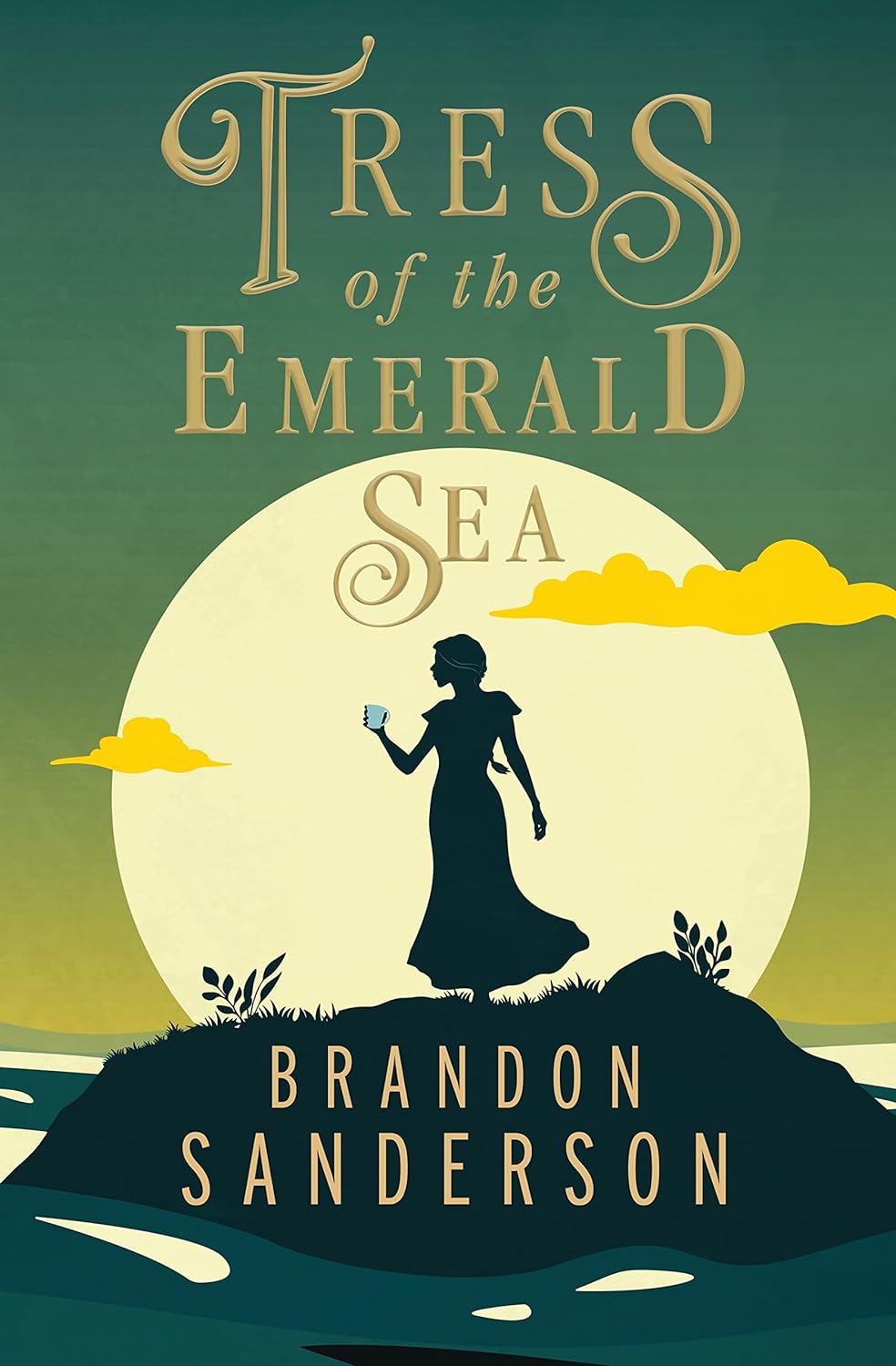
Continuing on the theme for adventure, I decided to switch it up and read a fiction book for the first time in a while. I had never heard of the author or the “world” that this book hails from, but it was recommended by Joanna Robinson in a Ringer podcast. I am extremely glad for the recommendation - this is one of the best works of fiction I have read, and probably my favorite since I read the Three Body Problem.
The inspiration for this book is “The Princess Bride”, but what if the Princess took matters into her own hands and looked for Wesley. Tress is the titular character, and it’s amazing how much she grew on me as a character. She is very simple to start off with - her defining trait is her love for cups and collecting them. Over the stretch of many chapters, she smuggles herself off her island, becomes a pirate, invents new contraptions, makes loyal friends, and defeats a sorceress.
All of it is written with great detail and a pleasant tone. The narrator of the story is in fact a character of the story, and becomes increasingly more pivotal as the book goes along. One of the most interesting conceits of the world is that there are these different spores, which fall from the moon, and which all have different reactions to water. You (the reader) learn more about how these spores work along with Tress, as she is entrusted with becoming essentially the expert on them for her pirate ship.
I have no idea if this book will be turned into a movie, but it kind of seems inevitable to me at this point.
Fake History by Jo Hedwig Teeuwisse

I had high hopes for this book, but it was a little bit of a letdown. I discovered the author originally on Twitter. She would frequently debunk historical photos or facts, particularly calling out poor photoshop jobs or stories that didn’t make sense historically. Unfortunately, this book is written too much like a series of twitter posts. The author lists 101 fake history items, but each of them are extremely short to read, not more than a few minutes spread across 1-2 pages. She’s also very literal (which I guess historians should be), so some of what she is debunking is technically true, but maybe not in the spirit of what the historical post is meant to convey.
The biggest disappointment, though, is that the book kinda has no character. It’s written very factually, but because of that, it’s just not that interesting to read.
Into Thin Air by Jon Krakauer
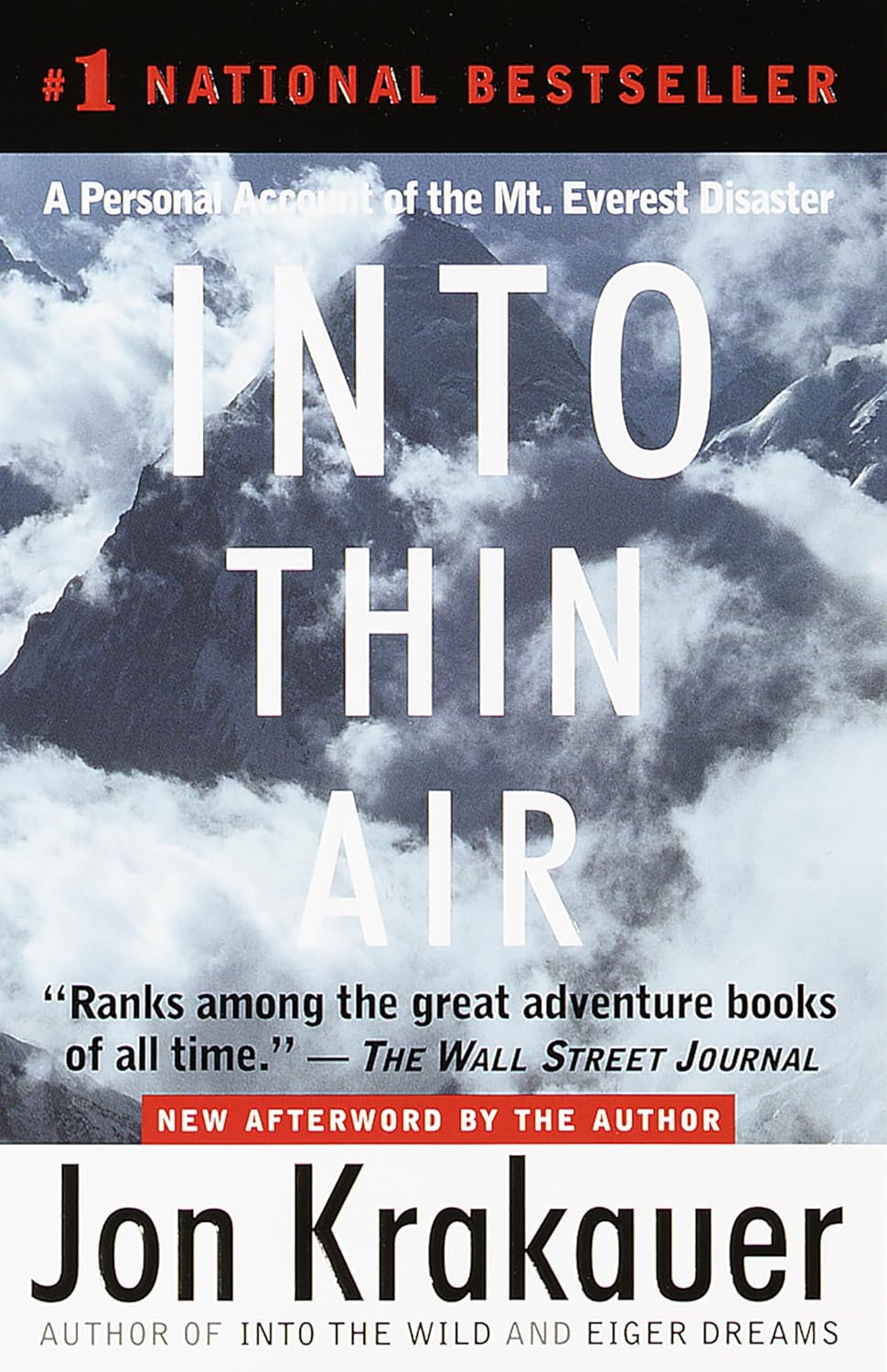
I was aware of this book for a while, and I wanted to read the Krakauer’s other well-known work, Into the Wild, first. Well, this book exceeded all my expectations, and I think it might be one of the most incredible nonfiction true story accounts I’ve ever read. The book chronicles Krakauer’s climb of Mount Everest, and the tragedy of several other climbers dying from the trip. It is well written, tense, and exciting. Even as someone with no mountain climbing experience, it was very easy to follow along.
The central premise of the book was that climbing Mount Everest had become industrialized, and that anyone with enough money and in even decent shape could be shepherded up the mountain via expert guides. These guides teach the clients where to go and what to do, and they include several native sherpas to help and carry food and supplies. Predictably, everything goes wrong. Some of the clients just aren’t experienced enough to weather the elements. The guides compete with each other. One particular guide lets his ego override his responsibility, and possibly puts his clients at risk as a result. And finally, the weather doesn’t cooperate, and a huge storm shows up just as the climbers are at the summit, making it nearly impossible for many of them to come down. Ultimately, the ending is sad. Many people die. The author has a tremendous amount of survivors’ guilt.
Personally, while I have ramped up in many areas of adventure and exploration in my middle age, very high altitude mountain climbing has never interested me. I went through a hiking phase, and I am still currently in my skiing phase (I just recently skied down my first double black!). But this type of mountain climbing just sounds terrible, not just because of the cold and the craft, but especially because of the elevation. The book mentions so many very fit and able climbers that have nevertheless succumbed to elevation poisoning, and it just seems like making these climbs is a little bit like playing Russian roulette.
Extremely Hardcore: Inside Elon Musk's Twitter by Zoë Schiffer
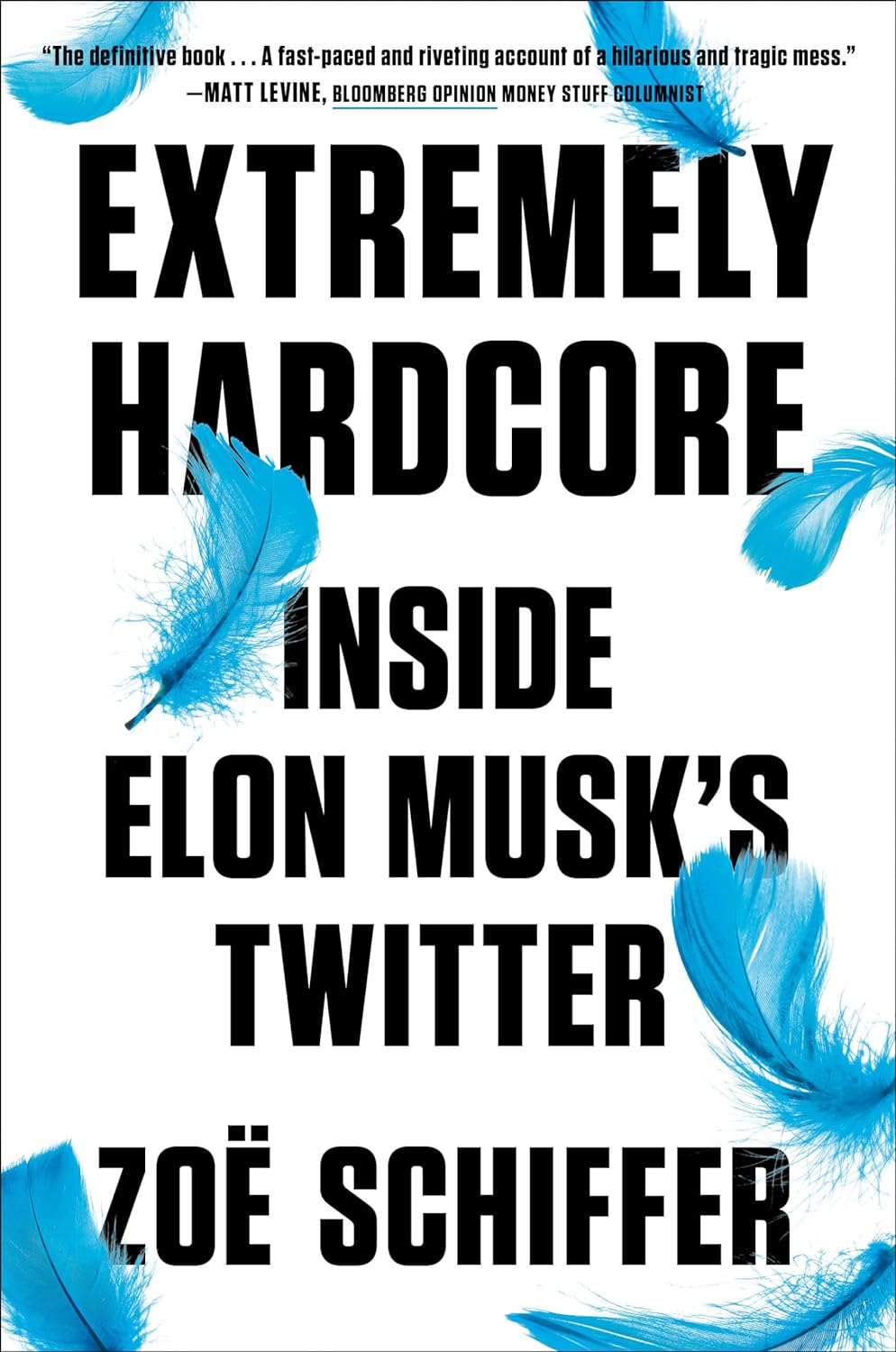
We’re all living through Elon Musk’s…interesting transformation into whatever it is that he is now, highlighted by his purchase of and running of Twitter (now X.com). I was previously an avid Twitter user, like much of tech silicon valley. Since his takeover, and the extreme divisiveness and uptick of bot activity, I have sadly deleted Twitter and moved to Threads, where the experience just isn’t the same. This is a happy result, to be sure. I spend less time on my phone, and more time reading. But of course, a part of me misses those halcyon days where you could just log onto Twitter, and learn about whatever the outrage du jour was.
This book is basically a summary of the last 18 months, from Musk’s original interest in Twitter, to the purchase, to the absolute running of it into the ground. I completely inhaled this book. It is the classic definition of a page turner. It’s written in a very simple and conversational style, so it’s easy to read through many chapters in one sitting.
Ultimately, the book doesn’t reveal very much new beyond what we’ve already seen reported in many other places. The author, Schiffer, is on the front lines of much of that reporting, so it’s only appropriate that she wrote the book for it. One nice thing is the book shares some of the perspective of specific Twitter employees, although I wish there was more of that.
Taking a step back and thinking through this entire era, it really is the real life embodiment of the “the emperor has no clothes”. We all just assumed Musk was this genius business person / engineer, through his success with Tesla. But the more you peel back the covers, the more you realize that not only is he not a genius, he’s actually just kind a of a dumb narcissist. There’s a quote in the book from a very senior principal engineer of Twitter, which he gave after Musk’s first all hands after purchasing the company. I’m going to paraphrase, but the quote was “he (Musk) either hasn’t spent very long thinking about Twitter’s business, or he’s extremely dumb”. It turns out, that actually both were true.
Burn Book: A Tech Love Story by Kara Swisher
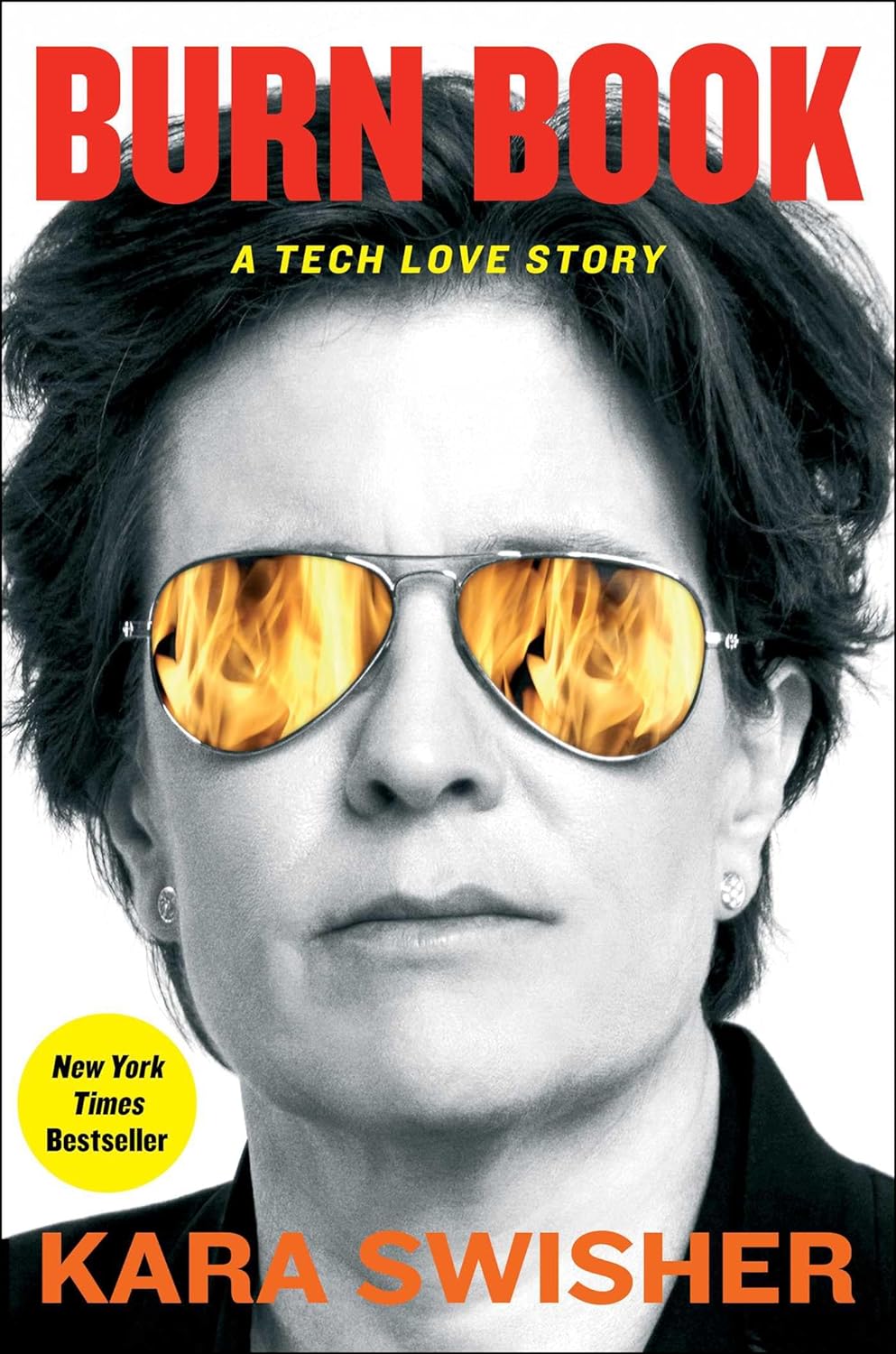
Kara Swisher is an absolute legend among tech circles in Silicon Valley. I used to religiously read AllThingsD and then even Recode for a little bit, before slowly transitioning to getting most of my tech news from Twitter and now Threads. This book is a memoir for her, where she recounts her career and her relationship with some of the major tech leaders of the past few decades, including Steve Jobs, Bill Gates, Elon Musk, Mark Zuckerberg, and so on. The book is unfortunately a little too shallow. I already know the basics of how Google, Amazon, etc. started off. The highlights of the book are when Kara talks about herself, but that really only happens a little bit in the beginning and then the end. It was still a nice read, and would serve as a really good intro to the major Silicon Valley characters, but I suspect anyone that already knows who Kara Swisher is will be looking for more.
Judgement of Paris by George Taber
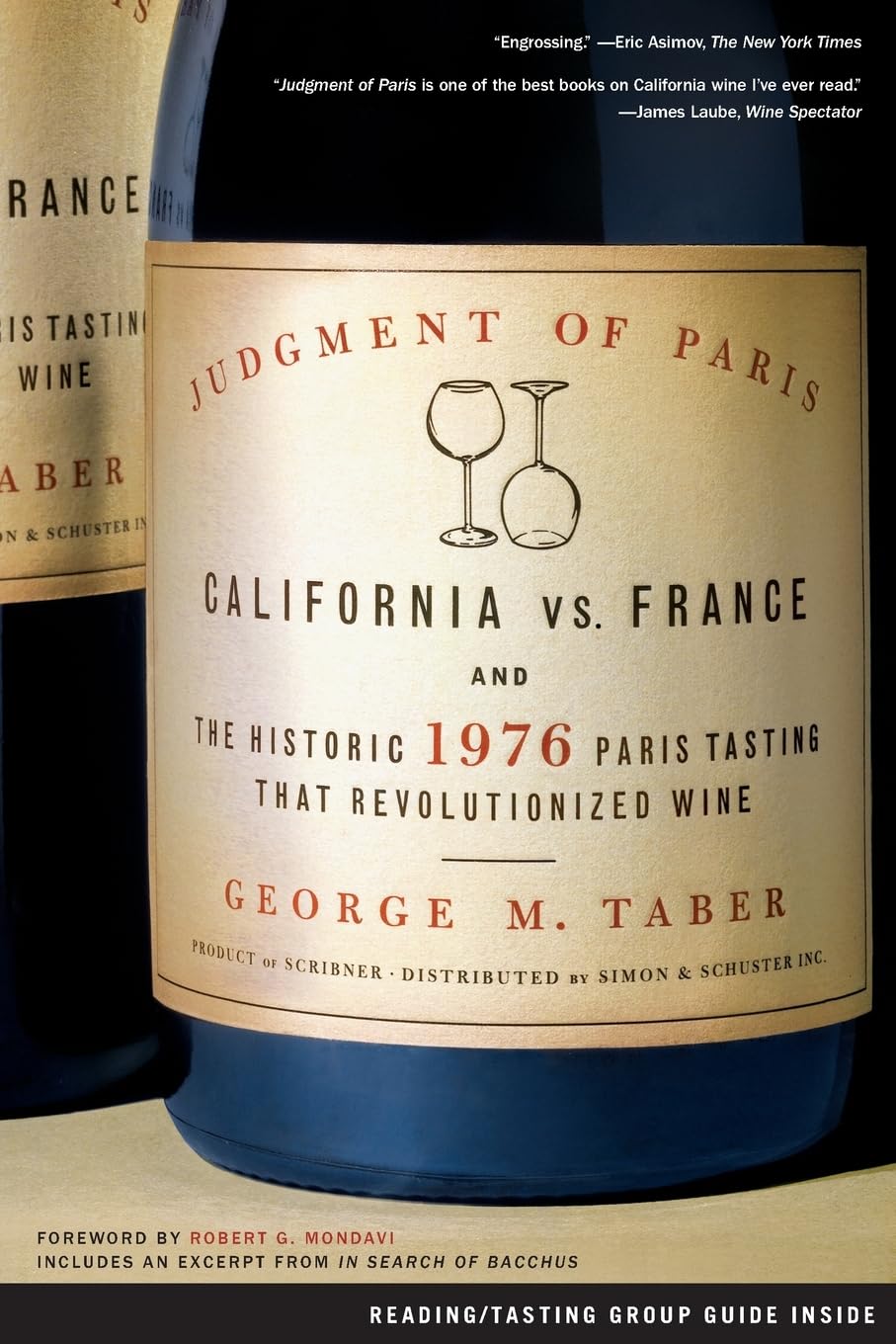
I have increasingly gotten into wine. Part of this is reaching middle age. Part of this is having a little bit more money to spend on finer luxury. Part of this is living in Califronia and being so close to one of the wine epicenters of the world. But regardless, I find my appreciation for wine to have grown quite a bit.
This book is the perfect book to get an introduction to Napa Valley wine. Its focus is on the Judgement of Paris, an informal wine tasting in 1976 in which several Napa Valley wines placed higher amongst French judges than even the best French wines. But really this book tells the story of the winemakers and the pioneers that built this whole business up.
There were quite a few things that surprised me. First was just how completely informal this competition was. I had heard about this anecdotally and in other media. But the reality is that this was an informal thing, put on by a single wine store proprietor, that fit into a single afternoon (and they had to hustle because there was another event that had reserved the hotel ballroom for the evening). The impact of the event is enormous, but the event itself was very humble.
Second, I was surprised at how new the whole wine trade was in Napa Valley. The region had always grown grapes and made wine, but the primary focus was on jug wine that would be very sugary and fortified (so definitely not the high end stuff we think of today). The winning wines in the competition had really only been around for a few years, and in many cases, the wines judged were on their first or second vintage.
Third, the main characters of the book are absolutely delightful. It’s incredible that the winemakers really all kind of just lucked into the trade. Warren Winiarski was a professor of classics at the University of Chicago before wanting to do something closer to the land. Mike Grgich was a humble immigrant that did all sorts of odd jobs before going into wine. What all of these characters had in common was a love for not only wine, but the idea of wine. Many of them spent time during their formative years (either childhoold or young adulthood) in Europe, where the wine was both good and plentiful.
This is one of those books that celebrate the extraordinary among the mundane. The impact of people like Warren Winarski and Stags Leap Wine Cellars is so huge on an entire region and an entire industry. But you find that the people actually doing the work are just ordinary people, that sometimes get lucky, sometimes have good ideas, and always put in a ton of hard work. ter
Wild by Cheryl Strayed
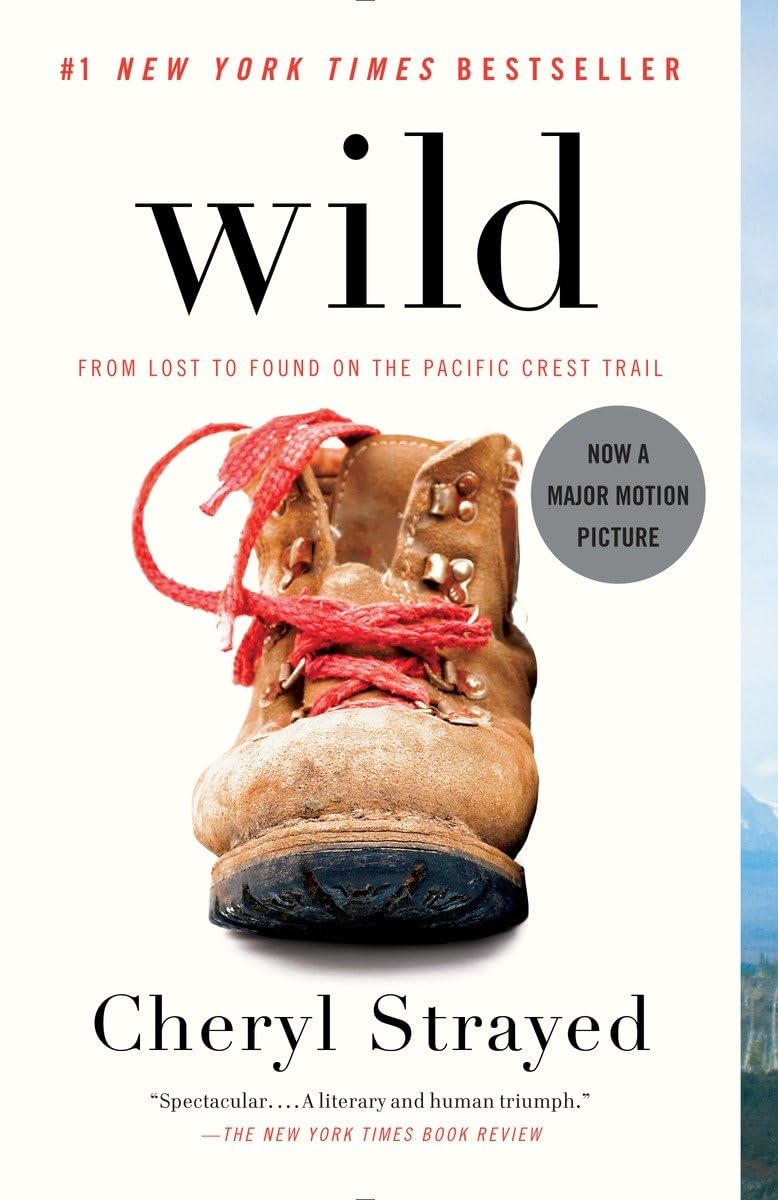
I actually saw the movie for this prior to reading the book. The movie was enjoyable, and it turns out that it was actually pretty faithful to the book (although just a subset of the adventures). Cheryl Strayed is a very good writer who kept my attention the whole way through even though very little actually happens from a plot perspective. The book tells the story of the author’s decision to drop everything and hike the Pacific Crest Trail for several months. She succeeds and finds herself in the process. Definitely a little formulaic, but again, the writing itself is really good, and Cheryl as a character and author are charming enough to keep it engaging.
Slaughterhouse-Five by Kurt Vonnegut
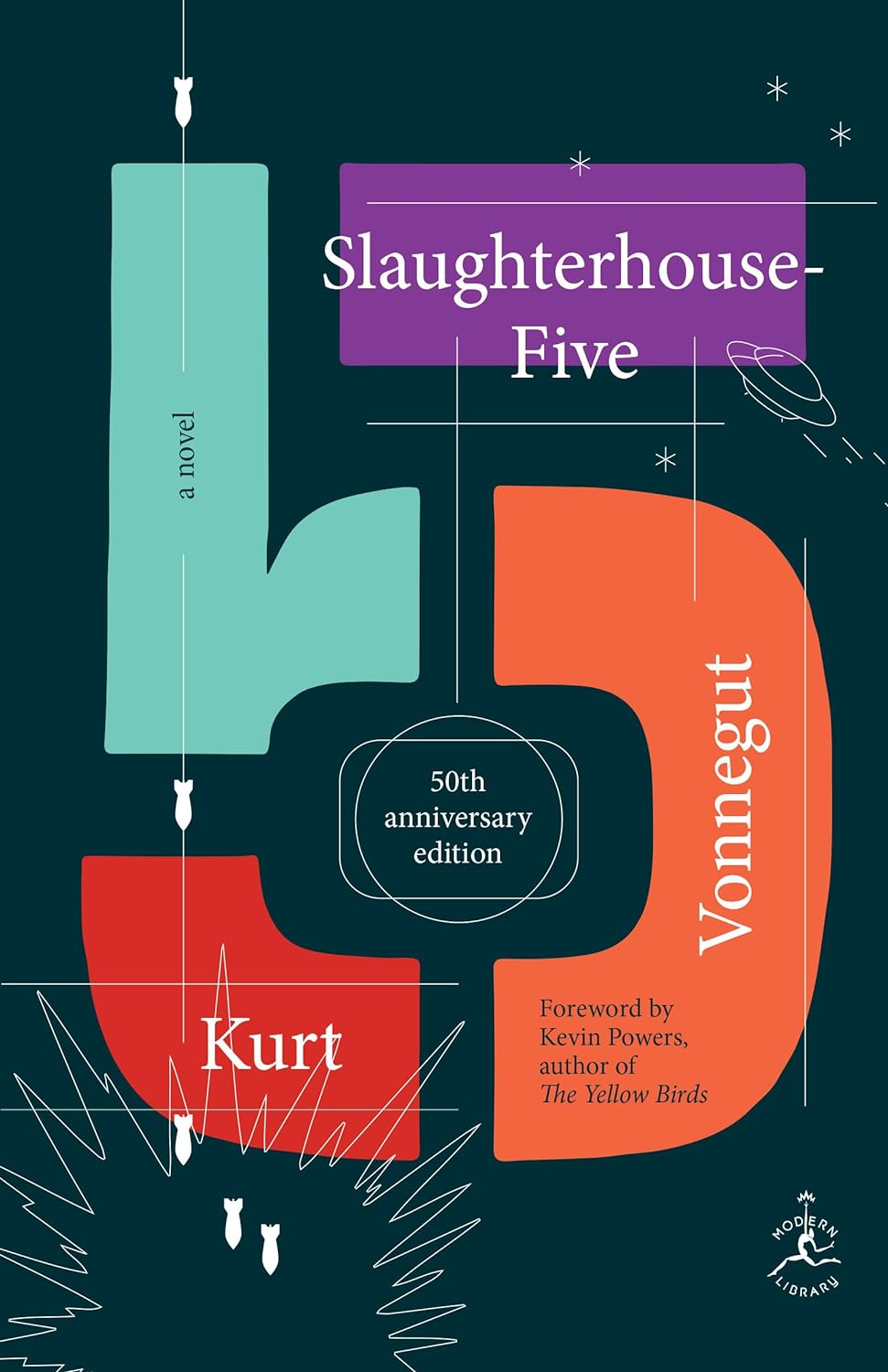
So it goes.
This book is clearly a masterpiece but was depressing as hell to read. It tells the trauma and the clear PTSD of a WWII veteran who lived through the Bombing of Dresden. I feel like this book has “won” in many ways because the perception of war has changed so much since it was originally published in 1969. At the time, perhaps the viewpoint of the book was more revolutionary, but now, as I’m reading it, I find myself just finding the conclusions and themes of the book to be obvious. War sucks. It sucks for everyone involved. There are no winners. This book tells that story in frightening detail and specificity.
Piranesi by Susanna Clarke
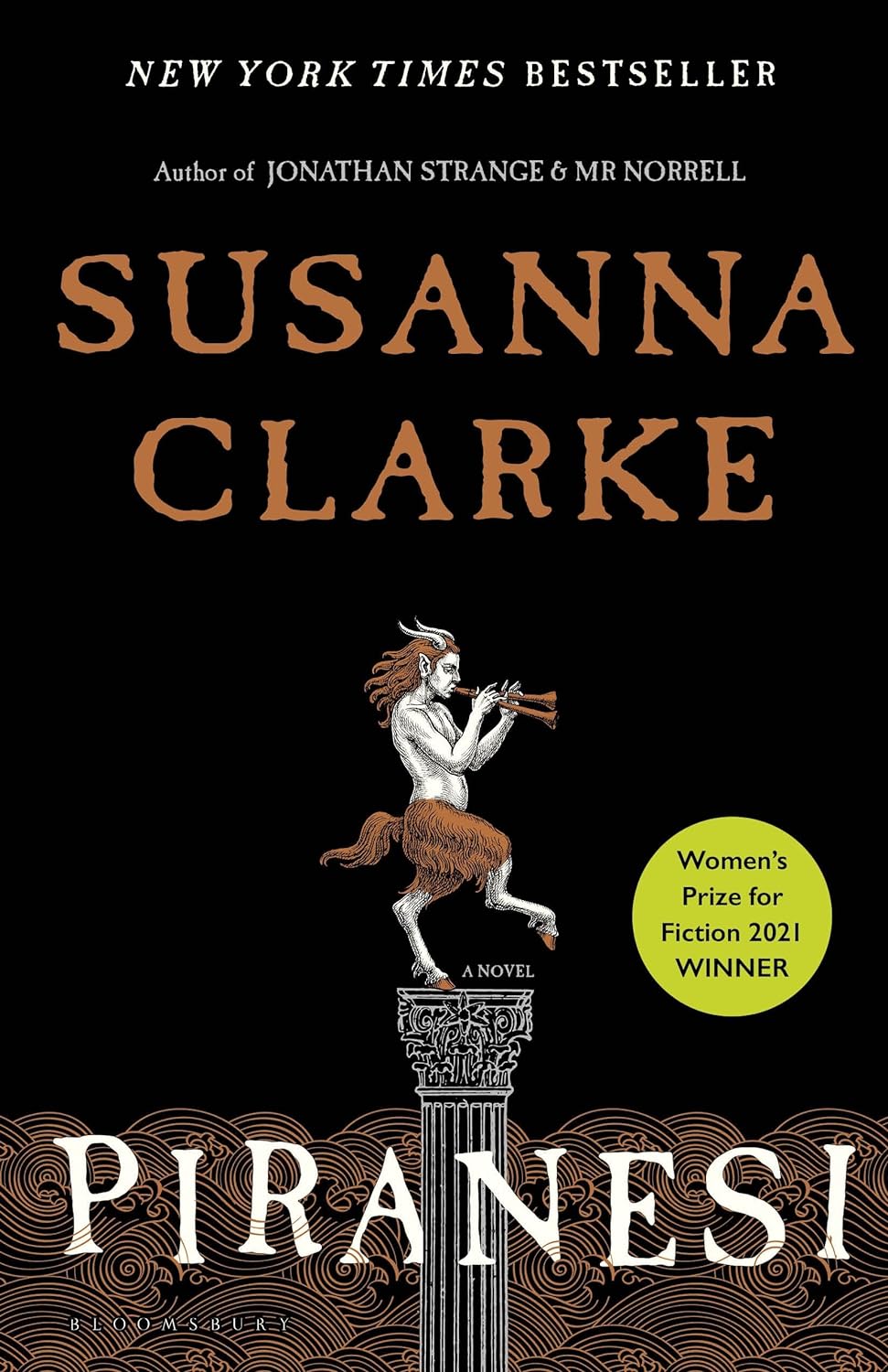
This was a nice quick read, that was both a page turner and a bit shallower than it could’ve been. This is fantasy fiction, with a dream world being the central mystery behind the book. The author does a good job of dropping many hints along the way that something is clearly amiss. Unfortunately, the actual reveal is a bit lackluster, and the conclusion doesn’t quite live up to the promise of the mystery. One other nitpick is that there are many oddities and eccentricities that never get explained, and as the reader, they are just left to be part of the fantasy dream world. Still, it was very absorbing, and I finished it quickly.
The Sports Gene by David Epstein
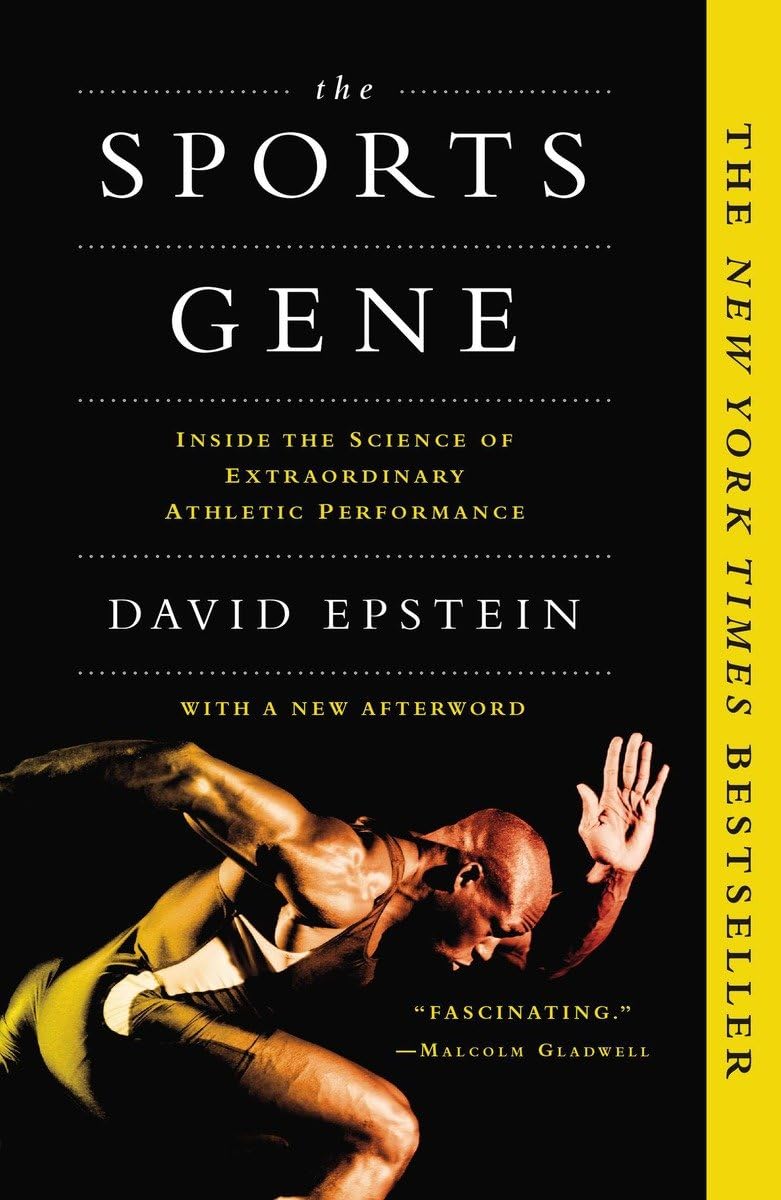
I have been a huge fan of David Epstein since reading Range, and I decided to check out his earlier work. This book explores the science (and often, biology) behind high performance athletes. It looks in depth at why world class sprinters tend to come from Jamaica or why world class distance runners come from Kenya. It asks the question of whether this is nature or nurture. And it does a great job of illustrating that the answer is, of course, both. For Kenyan runners, the main biological factor is the composition of their bodies, where they have very thin calves and ankles and very narrow hips. Both of those are conducive to long distance running. But the environment is just as important, where extreme poverty and a very low barrier to entry for distance running (and the large paychecks for winners) encourage nearly all the population to try their hand at the sport.
Epstein’s writing is, as in Range, very engrossing and very human. He is interested in telling real personal stories, while also explaining the science along the way. One of the nice discussions is around mutations, and how there really are certain mutations that might help in high end sports. Basically, like the X-Men, but on a smaller, more imperceptible scale.
Under the Banner of Heaven: A Story of Violent Faith by Jon Krakauer
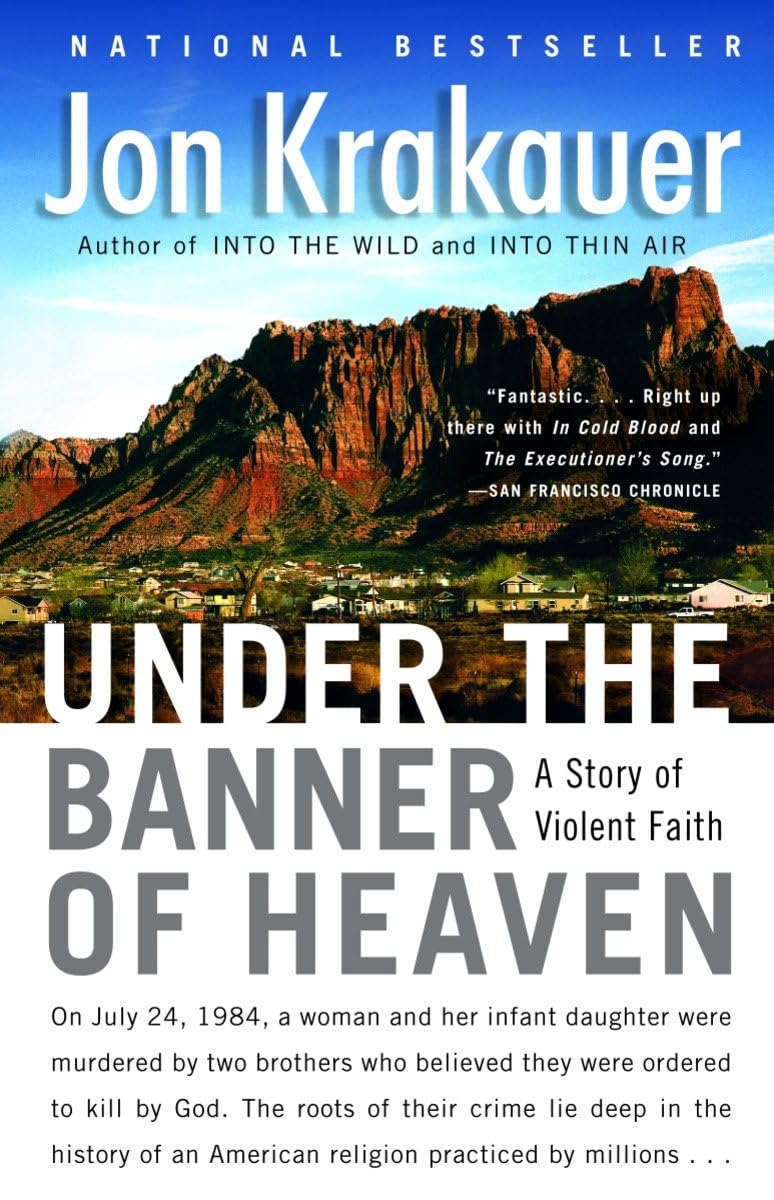
Krakauer’s writing and prose is so reliable. This is now the third Krakauer book I’ve read, and while the subject matter is completely different (religion), it was no less enjoyable. Krakauer details the grisly murder of a young Mormon wife and her infant child by her fundamentalist Mormon extremist brother-in-law. Along the way, we get a quick version of the history of mormonism, its founder Joseph Smith, and the trek of the group across the US to their settled land in Utah. It goes deep on the roots of polygamy, which was advocated for by Joseph Smith, but subsequently banned by the church leaders after Smith’s death and due to considerable pressure from the US government.
It’s fascinating to read about the history of Mormonism, because unlike with Christianity or other more ancient religions, Mormonism was only established less than 200 years ago, and it was well documented at the time. We know what Smith wrote. We know how he died (basically killed by a mob of Missourians that wanted to drive the Mormons out of town). We even know when he started practicing polygamy, and how his first wife felt about it (she hated it). Today, it’s one of the largest religions in the US.
The actual tale of the murder is sad and somewhat predictable. The brother-in-law became radicalized with fundamentalist Mormonism principles. One of those is the idea that Mormons speak directly to God, and can receive instructions directly from God. Well, this guy received a directive to kill his sister-in-law (presumably due to various slights and petty jealousies on his part). While the story is sad, it’s something that no doubt happens every year in the US.
A Wizard of Earthsea by Ursula K. Le Guin
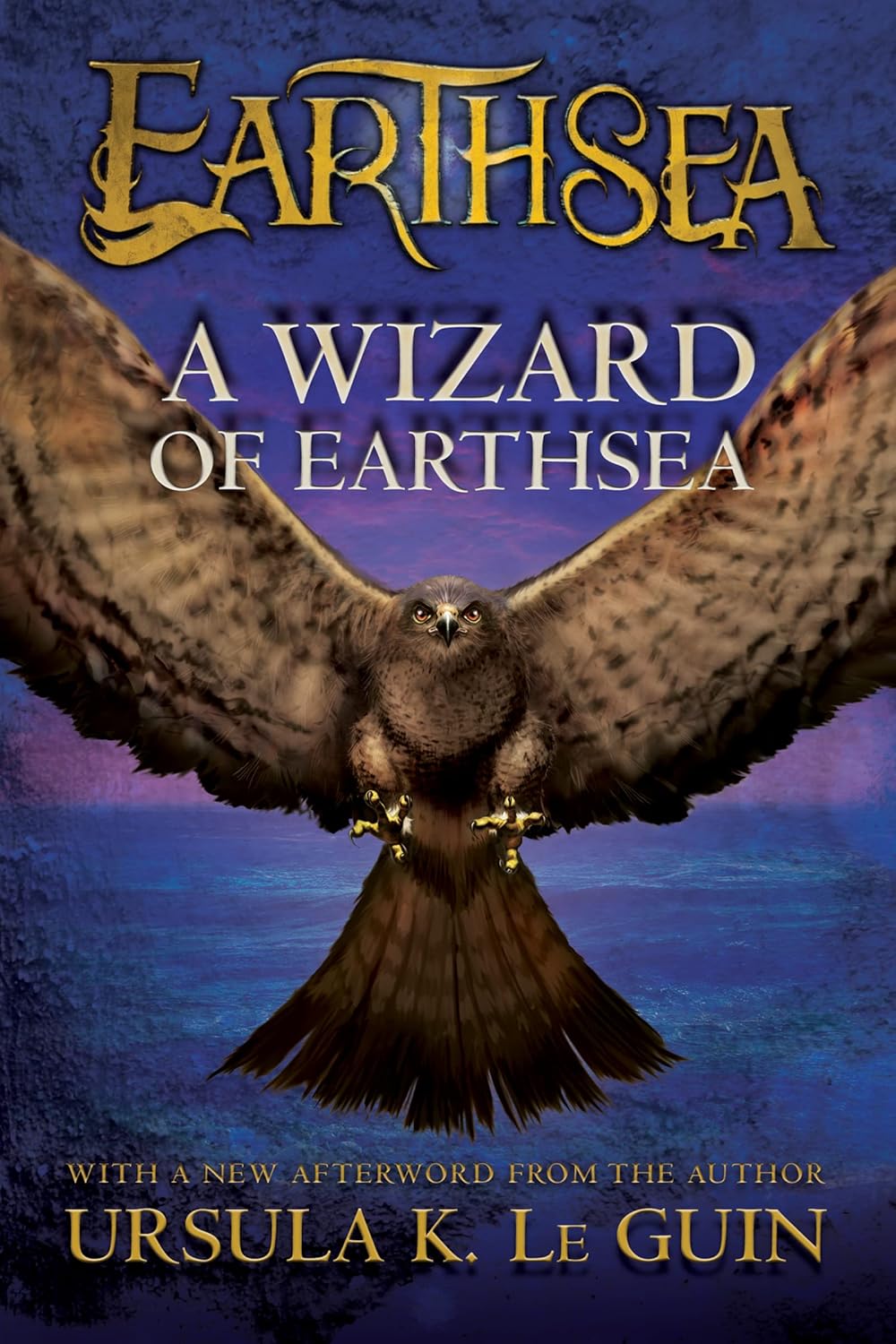
I was always somewhat aware of Ursula K. Le Guin the writer, but it wasn’t until I saw a reddit post from someone praising the beauty and detail of her prose that I decided to look into some of her books. The Earthsea books are very simple, accessible to young adults, but I still enjoyed this very much. It’s a completely linear story, telling the tale of Ged the aspring wizard, as he seeks to “undo” a deathly spirt that he unleashed as an act of hubris. The book is a classic coming of age story. In the end, Ged understands that the shadow he unleashed is fundamentally a part of himself, and he has to live with the consequences of his actions. While the story is very simple, Le Guin’s writing is very detailed and flowing. As a result, the archipelagos of Earthsea feel very lived in.
The Tombs of Atuan by Ursula K. Le Guin
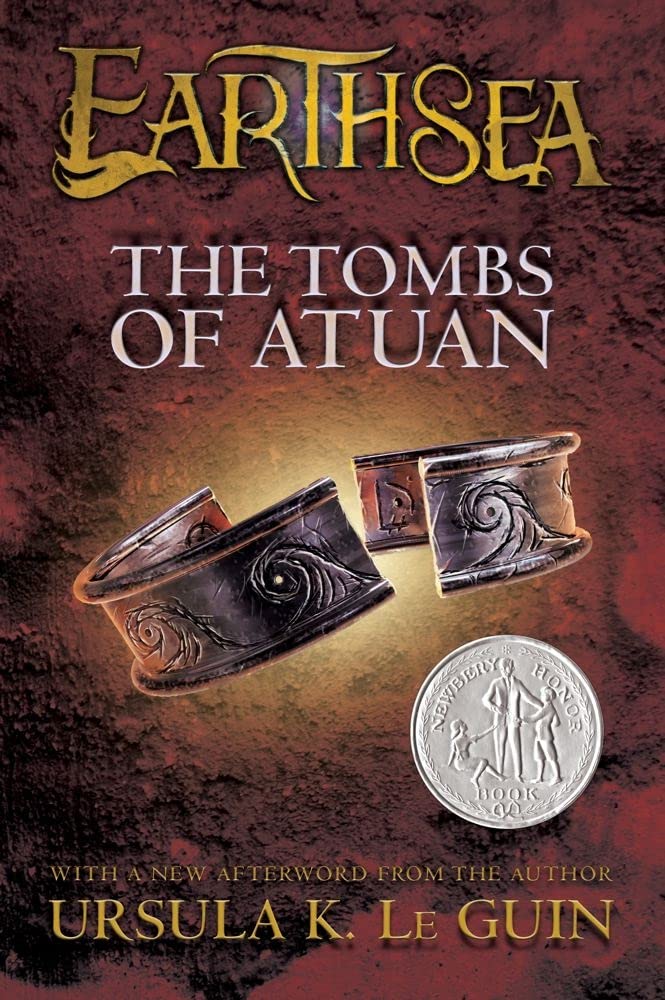
This is the second book in the Earthsea series. It introduces Tenar as the main character, and details her coming of age story. Ged is the secondary character, who aids her in her journey. Like the first book, this one is completey linear. Also like the first book, the prose is incredibly detailed and descriptive. Ultimately, I don’t think this book broke much new ground, although it was still pleasant to read.
The Farthest Shore by Ursula K. Le Guin
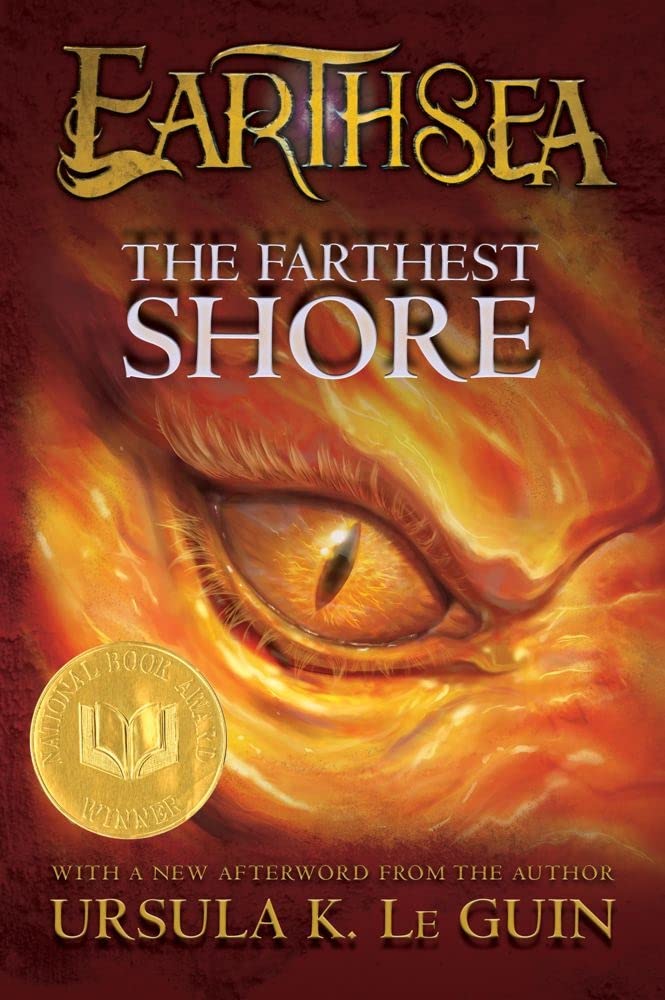
This is the third book in the Earthsea series. This time, Ged is still the secondary character, although he is old and wise now as the Archmage. The main character is Prince Arren, who later on becomes the King of Earthsea who unites all the lands together. This book again is a coming of age for Arren, but I felt this was the weakest in terms of actual character development. Upon finishing the book, I don’t feel like I really learned that much about Arren, and his ending as the eventual King seems unearned. The theme, however, of trying to escape death but failing to live as a result, is very interesting.
Outlive: The Science and Art of Longevity by Peter Attia

I think this will end up being one of the most important books that I’ve ever read. Peter Attia breaks down the various factors that contribute to extending one’s healthspan (i.e. the span of life when you are actually still physically and mentally able). There’s all the usual stuff, around the importance of exercise, eating well, sleeping well, and staying emotionally and spiritually healthy. But what makes this book special is it’s tries to detail the why in doing these things. Why do most people generally die from heart disease, cancer, etc.? How does our physical body and what we eat contribute to that? Because the book does a great job of tying these things together, I think it’s much easier to believe.
There are a few things that I took directly from this. One is the importance of building muscle. I have been on a several-years journey to lose weight, and the main way I’ve achieved that are lowering calories and doing a lot more aerobic exercise. However, one thing I have noticed is that my muscle mass and general bodily strength has decreased a lot as a result. I used to be able to dribble a basketball into someone and easily dislodge them from their guarding position. Part of the reason for that is I was 225+ pounds and reasonably quick for someone of that size. Now, I am much lighter, but I didn’t have the corresponding muscle mass to complement it. I started lifting weights roughly 2 months ago (I started reading this book much earlier), and it actually has been a huge mental boost. One, I feel much better, because I can see the muscle developing. Two, lifting weights is adding more endorphins and making me more likely to keep lifting. Three, I actually feel different on the basketball court, and I can assert my strength not much more easily than before.
Two, I’ve decided to take Yoga and general balance/streteching/stability more seriously. I have not put this into practice as readily as strength training, but I have now done 3 yoga sessions in the last 3 weeks, which is 3 more than I have in the entire year prior to that.
Finally, I’ve started eating a lot more protein. Protein really is almost like a performance enhancer. It builds muscle, and it doesn’t contribute too much to calories and gaining weight. My diet has now shifted a lot more toward yogurts, nuts, and fish, and I have deeply enjoyed that so far.
comments powered by Disqus